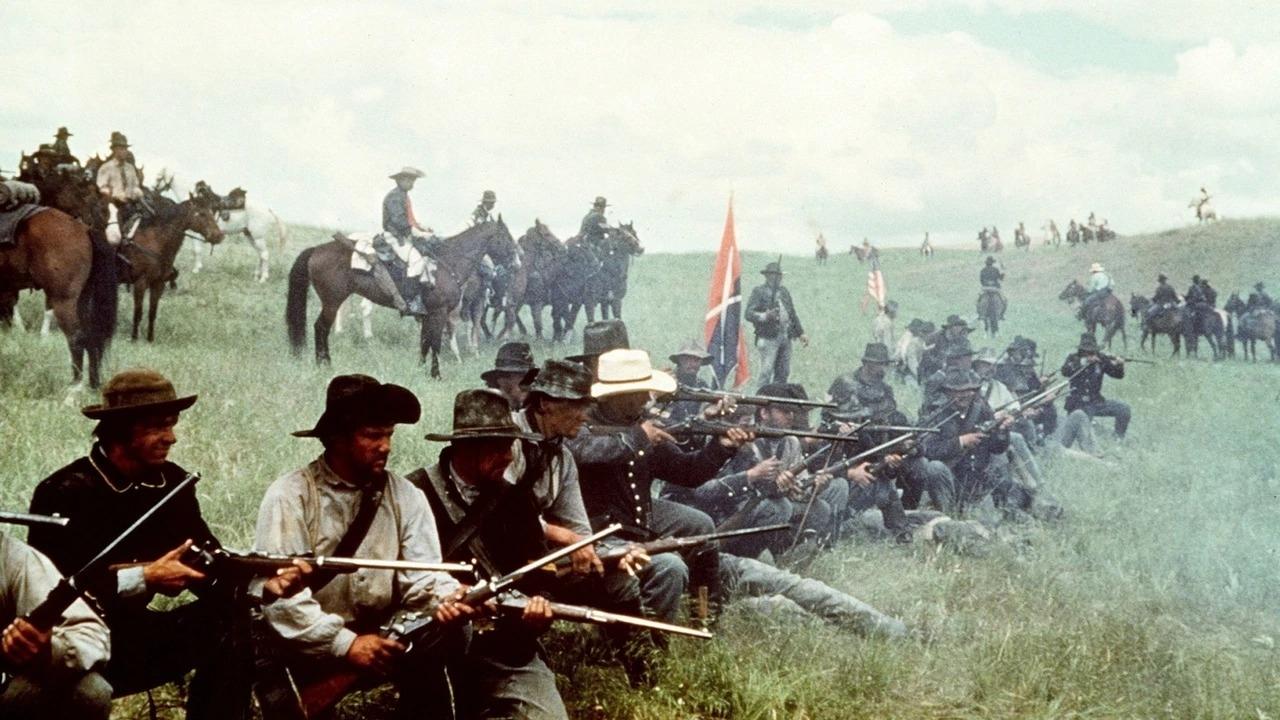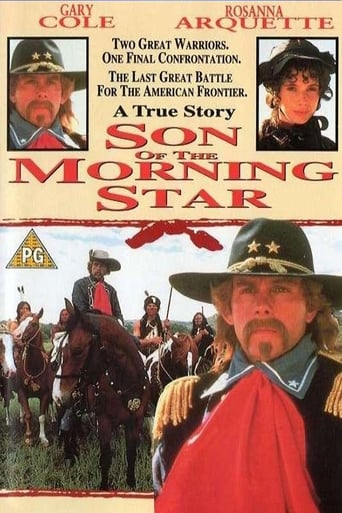

General Custer is one of the most controversial figures in American history. He is perceived by some to be an egotistical, murdering, glory hunting pariah but to others he is almost a saintly figure to whom history has been most unkind. The truth inevitably lies somewhere between the two. Custer was indeed egotistical and also very ambitious, but he most definitely was not a murderer. Custer was a man of his time, a professional 19th century soldier obliged to carry out the duties of his office. No matter what he personally (and a letter exists to prove that Custer was against an Indian war) felt about his orders. Son of the Morning Star makes the mistake many make when dealing with Custer. It places 20th century 'politically correct' sensibilities upon the events of his later years which distort the truth to an alarming degree. Custer did not 'murder' women and children at the Battle of Washita, evidence exists to prove that he did, in fact, prevent soldiers from such acts although many were killed before he could intervene. Custer did not 'leave some of his men to die' after the battle, he was forced to withdraw as a large army of Sioux approached his position and he was ill-equipped to deal with them. Custer was vigorous in his determination for Indian Agencies to supply the reservation tribes with the food etc that they were entitled to, risking his own career in the process. And finally, at the Little Big Horn, he did not go charging in without thought or rationale. He presumed (incorrectly) that the tribes were escaping and, after giving orders to his subordinates which they did not obey, went in pursuit. Unfortunately there were many more Indians to deal with than expected so he held a defensive position and waited for reinforcements which did not come, due to the failure of others. Consequently he and his men were annihilated. Custer was a complex man, something that this film attempts to touch upon but is let down by it's emphasis on debunking anythinhg positive to be said about him. it's about time someone made a 'real' film about Custer. One that portrays his fine record in the Civil War (he is still the youngest ever General in the US army) and how he was an inspiration to his men. How he displayed great tactical knowledge and extreme bravery under fire. People laugh at Errol Flynn's portrayal of 'Saint Custer' and indeed the latter stages of They Died With Their Boots On are laughable, but the depiction of Custer during the Civil War is (although heavily stylised) very accurate. The flamboyant uniform, the cry of 'ride you wolverines!', marching to Garry Owen - this stuff really happened. After the war Custer was given one tawdry job after another by the army. He disgraced himself on more than one occasion and was ultimately court martial-ed, but he performed his duty for his country and should be remembered for the role he played as a winner in the Civil War, not just as the loser at the Little Big Horn. Cinematically, the film is escellent, with good attention to detail and fine staging of the battle scenes. It's a shame it is flawed by a ha'porth of tarred scripting.
... View MoreHaving come late to this website I find that earlier comments have said everything I want to. My video-recording of the film is one of the very few I've bothered to keep.It appears 98% authentic, and a lot of effort seems to have been made to make those acting the junior officers look like the men themselves. I'm not so sure about Gary Cole, though; he looked like a sack of potatoes on his horse and he didn't seem too inspirational. But photos of Custer himself make him look a bit insipid - weak chin, droopy moustache - and apparently by 1876 he was beginning to go bald; Cole is a better likeness than Errol Flynn or Robert Shaw were, but we have yet to see a definitive screen Custer. David Strathairn has screen presence as Benteen. The voice-overs by Kate Bighead and Rosanna Arquette were remarkably similar in tone - almost dirge-like.
... View MoreAs near as anything has yet got to a true and accurate reflection of the 1876 summer campaign; this film displays not only the history of the white push into Montana after Grant's "hostiles" and the final conflict on the Little Bighorn, but also explores the psychology and personalities of the important members of the 'Custer Story'. If one understands the mental reasoning, then one can have a better overall grasp of the history in a film which is largely liberated of possible romantic nonsense that movies in the past rated viable.Son of the Morning Star also, commendably and thankfully, explores the history, society and feelings of the native peoples. The film removes the tinted image of the Indians being brutal and thoughtless heathen savages, allowing an audience to build sympathies for a people who were being invaded and eradicates the idea that these were a dark and quiet race who would sell their own mothers. And about time too. If that is all that a viewer take from this film, then it has certainly achieved one of it's objectives.Not only is history, society and emotion addressed (the emotional angles are most effective, e.g. Custer's relationship with Libbie, the contrast of Crazy Horse and Custer etc-all very clever, potent and emotionally though provoking), but the filming locations are very good (I have been to the Little Bighorn and Reno's fighting ridge is an exact looking filming location as one could wish for) and the atmosphere created by minor details of dress, action (see Reno's hat in the battle) and background is wonderful.You want a Western? You want Son of the Morning Star.
... View MoreI generally find Gary Cole rather uninteresting as an actor. But he does a good job in edgy roles, like Jeffrey MacDonald in "Fatal Vision" and George A. Custer in "Son of the Morningstar." The movie has its flaws. It takes too long to get going and I found the Indian narrative tiresome.But it provides the most accurate Hollywood depiction of the events leading up to Custer's last battle and of the battle itself. Cole portrays Custer as a driven man, but not the madman of "Little Big Man" or the saint of "They died with Their Boots On." And it accurately captures the scenery of the Little Big Horn, not the bizarre desert setting of "Custer of the West." Most details, some not so well known, are handled accurately. Custer's men did not have sabers with them (little did Errol Flynn know). Custer refused gatling guns because they were too cumbersome to haul over the hilly areas the cavalry was expected to cover quickly. Custer couldn't see the Indian village from a distance when it was pointed out to him by his scouts. Custer hastily made his plan of battle after being informed Indians had taken some lost supplies and, thus, discovered his whereabouts. All of this comes out in the movie, so that we don't just get the standard Hollywood Custer-as-egotistical-glory-seeker story. The real story was far more involved than most people realize, and this film portrays most of those events. The film also shows that Custer's Last Stand was a combination of orderly resistance and chaos, as Indian witnesses contended.The film also does a good job with some of the other characters; Crazy Horse, Tom Custer, Major Reno, Captain Benteen and Captain Weir. Where the film misses out, in my opinion, is its failure to adequately depict the events involving Reno and Benteen during the battle. The film does an excellent job with Reno's charge, dismount and retreat to the bluffs, and with Weir's attempt to rescue Custer. But it should have gone further. The film has Weir's company merely returning to the reinforced bluffs. What we don't see is that Reno and Benteen actually mounted a slow moving trek following Weir's path, and all were forced to retreat to their original position where they fought valiantly into the night, while some soldiers who were left behind in Reno's retreat rejoined them after some harrowing moments hiding from the Indians. This portion of the battle has never been accurately portrayed on film (although "The Glory Guys" does a reasonably good job of it). And Morningstar squanders a great deal of time on far less interesting scenes instead of devoting time to this portion of the fight.So, while far from perfect, this is very much the best Custer movie ever made and highly recommended to anyone who wants to learn more about what really happened. I keep hoping that one more major Custer movie will get made and finally get it all right.
... View More